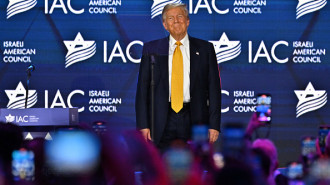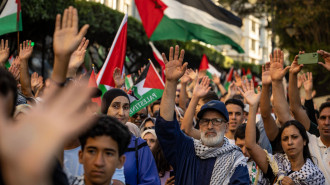Syria regime to 'join peace talks' with opposition in Geneva
The delegation will take part in talks starting on Wednesday afternoon and will be headed by Bashar al-Jaafari, Syria’s representative at the United Nations, the official said in Damascus.
The Geneva talks are scheduled to begin on Tuesday and the unified opposition delegation has already arrived.
In Geneva, three diplomats said representatives of the five permanent UN Security Council members were meeting to discuss the talks with a meeting between UN Special Envoy Staffan de Mistura and the opposition.
The officials spoke on condition of anonymity because he was not authorised to speak publicly to the media.
The Syrian opposition delegation is aiming for the removal of President Bashar al-Assad and plans to engage his negotiators in serious and direct talks, the head of the opposition delegation Nasr Hariri said on Monday, in remarks carried by Reuters.
 |
Since Russia joined the war on behalf of Assad’s government two years ago it has become increasingly clear that Assad’s opponents have no path to victory on the battlefield |  |
|
The main players in the Geneva talks on Syria Syrian regime Since the launch of negotiations on the Syrian crisis in Geneva in 2014, the Syrian regime has been represented by a delegation of political figures including its chief negotiator and UN representative Bashar al-Jaafari. The government delegation has always rejected opposition calls for Assad's departure, saying the leader's future should be decided by Syrians at the ballot box, and not during negotiations. Instead, they propose discussions on a reworked constitution and parliamentary elections, and a "broadened" government that preserves the regime's core infrastructure. The regime has so far refused to sit at the same table as the opposition, deriding some of its members as "terrorists" or saying they are too divided to represent a united negotiating partner. Opposition For the last two years, the opposition has been primarily represented in Geneva by the High Negotiations Committee (HNC), which groups the key opposition Syrian National Coalition, as well as representatives of armed rebel groups. Formed in December 2015 in Riyadh, the HNC has always insisted that Assad must step down at the beginning of any transitional period, with an executive body formed to oversee the following stage. Backed by Saudi Arabia and the United States, the HNC presents itself as the sole legitimate political representative of the Syrian opposition. But other opposition groupings have participated in talks on a separate basis, including the so-called Cairo and Moscow Groups, which the HNC accuses of toeing a more conciliatory line on Assad's future. This month, the different strands of the opposition met in Saudi Arabia to form a new delegation to attend the upcoming Geneva talks. For the first time, they agreed on the formation of a unified committee of 36 members from across the opposition. Eight members are from the National Coalition, with another four each from the Cairo Group and the Moscow Group. There are another seven rebel representatives. Other spots are taken up by independents and other opposition groups. The committee must now choose which of its members will head to Geneva as part of a delegation headed by the HNC's Nasr al-Hariri, who has served as opposition negotiator in previous rounds of talks. Staffan de Mistura The UN's special envoy on the Syria crisis Staffan de Mistura is an experienced diplomat who has joked that he suffers from "chronic optimism" despite the apparent intractability of Syria's conflict. A dual Swiss-Italian national, he was named to a post once dubbed "mission impossible" by then-UN Secretary General Ban Ki-moon in July 2014. He follows in the footsteps of two other seasoned diplomats, Algerian Lakhdar Brahimi, and former UN head Kofi Annan, both of whom quit after failing to make progress. Since 2016, he has presided over seven rounds of talks in Geneva, sporting his trademark pince-nez and an old-world demeanour reminiscent of European diplomats from a century ago. He has at times raised eyebrows with his unorthodox ideas and pronouncements, including offering in 2016 to personally escort extremists from besieged Aleppo in order to ease the crisis there. |
|
Hariri called for major powers, especially Russia, to pressure the Assad government into real negotiations on a political transition followed by a new constitution and free elections, in line with a UN roadmap to end the six-year war.
“We stress that political transition which achieves the ousting of Assad at the beginning is our goal,” Hariri told a news conference after arriving in Geneva for a round of UN-led talks scheduled to start today.
“Our goal in the negotiation will be the departure of Bashar al-Assad from the beginning of the transition,” he said.
A breakthrough in UN-backed Syria peace talks in Geneva this week seems hardly more likely than in seven failed earlier rounds as Assad pushes for total military victory and his opponents stick by their demand he leave power.
All previous diplomatic initiatives have swiftly collapsed over the opposition demand that Assad must go and his refusal to do so.
“We don’t have high hopes, the regime is using delaying tactics to obstruct progress towards a political solution, at a time when the opposition comes with one unified delegation,” Hariri said. “Russia... is the only entity capable of bringing the regime to the table of negotiations.”
For many years, Western and Arab countries backed the opposition demand that Assad leave office. However, since Russia joined the war on behalf of Assad’s government two years ago it has become increasingly clear that Assad’s opponents have no path to victory on the battlefield.
| Read more: Lifting Syria's regime siege requires more than just words |
The Syrian conflict began when the Baath regime, in power since 1963 and led by Assad, responded with military force to peaceful protests demanding democratic reforms during the Arab Spring wave of uprisings, triggering an armed rebellion fuelled by mass defections from the Syrian army.
The brutal tactics pursued mainly by the regime, which have included the use of chemical weapons, sieges, mass executions and torture against civilians have led to war crimes investigations.
The Syrian government continued its bombing and sieges of areas including 400,000 people in Eastern Ghouta, a rebel-held Damascus suburb, Hariri said on Monday.
“We are here for the hundreds of thousands who under siege who are in grave need of humanitarian aid and for hundreds of thousands of detainees who are at the verge of death, suffering but living death every day,” Hariri said.

![Palestinians mourned the victims of an Israeli strike on Deir al-Balah [Getty]](/sites/default/files/styles/image_684x385/public/2024-11/GettyImages-2182362043.jpg?h=199d8c1f&itok=xSHZFbmc)


![The law could be enforced against teachers without prior notice [Getty]](/sites/default/files/styles/image_684x385/public/2178740715.jpeg?h=a5f2f23a&itok=hnqrCS4x)
 Follow the Middle East's top stories in English at The New Arab on Google News
Follow the Middle East's top stories in English at The New Arab on Google News


